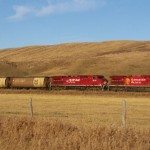Winnipeg | Reuters -- Western Canadian farmers, some of whom could not plant crops last year due to soggy soil, may be able to get a head-start on sowing their fields this spring. Canada is the world's biggest canola exporter and the second largest wheat exporter, but its flat western provinces -- Manitoba, Saskatchewan and[...]
Search Results for:
Search filters
- « Any Contributor
- Rod Nickel

Railways step up service as Ottawa eyes tackling grain backlog
Winnipeg | Reuters -- Canada's two big railways are stepping up service to reduce a backlog of grain shipments that have delayed exports and pushed oat prices to record highs, but the Canadian government said it may still step in with new regulations. Record crops of wheat and canola, along with frigid weather, overwhelmed Canadian[...]
Prairie frost coming, but little crop damage expected
Freezing temperatures look to arrive this week across parts of Western Canada, but steady harvest progress has left few of farmers' crops vulnerable to damage, industry officials say. The first significant frost often hits the Prairie provinces by mid-September, but temperatures have only dipped slightly below freezing overnight so far, in isolated areas. Colder air[...]
Feeding Texas Longhorns? Canadian farmers cash in on U.S. drought
After spring floods drowned his seeding plans two years straight, Walter Finlay is harvesting what looks to be an average or slightly better crop of wheat and canola. "Average" will do just fine this year. The worst drought in a half century in the U.S. Midwest has scorched corn and soybean crops, igniting grain and[...]
Rains stall Saskatchewan seeding
Farmers in waterlogged parts of eastern Saskatchewan are nearly out of time for fields to dry in time for planting, after steady rains in the past few days, provincial government officials said Wednesday. "Every second day for the past week, it seems like it's been raining and raining," said Daphne Cruise, regional crops specialist with[...]
Prairie flooding delays seeding two weeks so far
Farmers in flooded Western Canada look to plant at least two weeks later than normal as average to heavy snowpack melts on saturated fields and causes rivers to overflow. The most optimistic scenario would see farmers in Saskatchewan and Alberta, the two biggest producers of wheat and canola, start planting in early May, assuming that[...]


